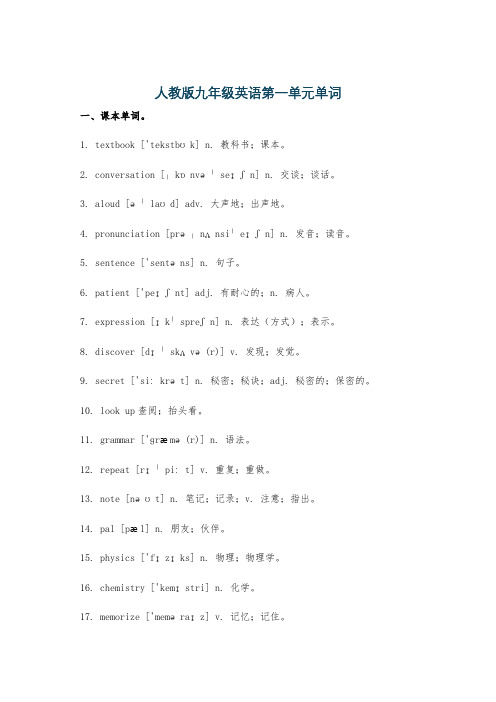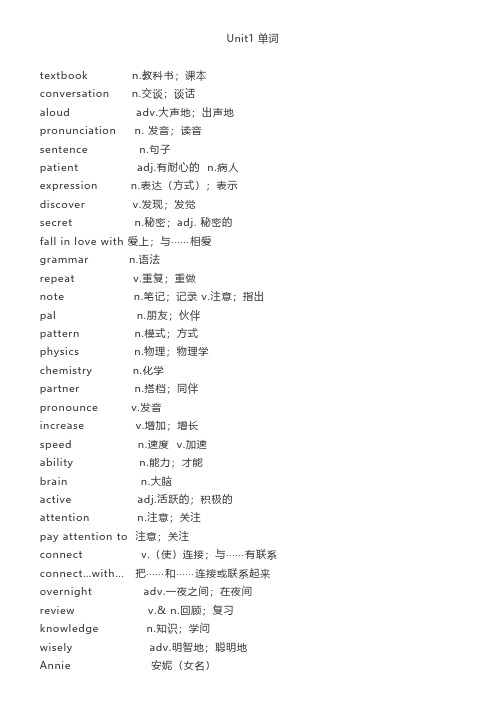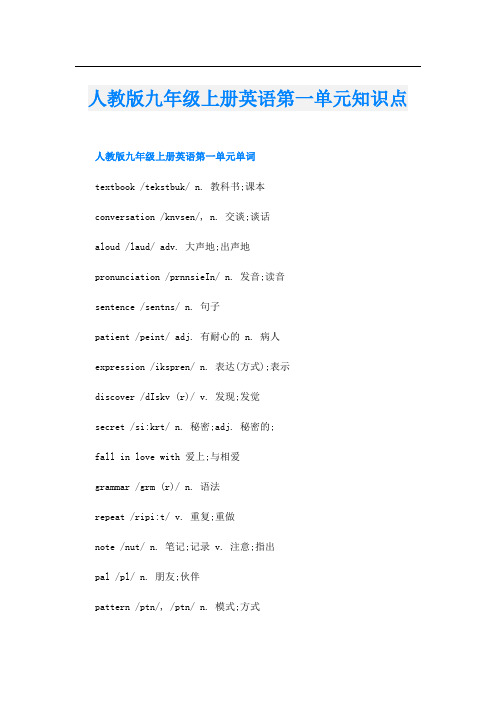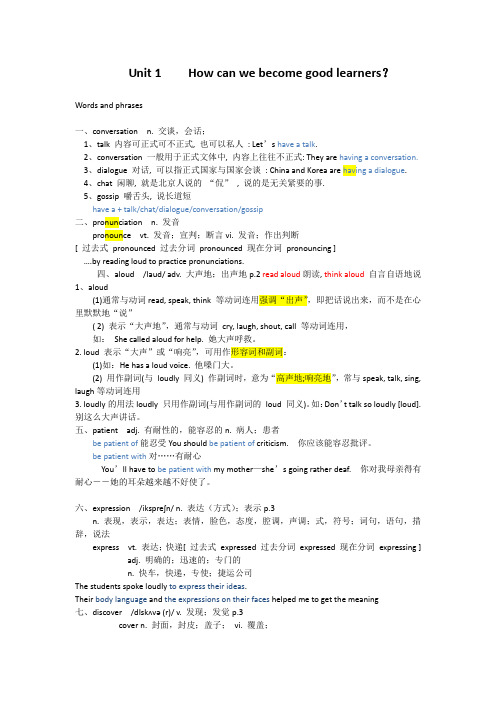人教版 九年级英语 第一单元
人教版九年级英语第一单元单词

人教版九年级英语第一单元单词一、课本单词。
1. textbook ['tekstbʊk] n. 教科书;课本。
2. conversation [ˌkɒnvəˈseɪʃn] n. 交谈;谈话。
3. aloud [əˈlaʊd] adv. 大声地;出声地。
4. pronunciation [prəˌnʌnsiˈeɪʃn] n. 发音;读音。
5. sentence ['sentəns] n. 句子。
6. patient ['peɪʃnt] adj. 有耐心的;n. 病人。
7. expression [ɪkˈspreʃn] n. 表达(方式);表示。
8. discover [dɪˈskʌvə(r)] v. 发现;发觉。
9. secret ['siːkrət] n. 秘密;秘诀;adj. 秘密的;保密的。
10. look up查阅;抬头看。
11. grammar ['ɡræmə(r)] n. 语法。
12. repeat [rɪˈpiːt] v. 重复;重做。
13. note [nəʊt] n. 笔记;记录;v. 注意;指出。
14. pal [pæl] n. 朋友;伙伴。
15. physics ['fɪzɪks] n. 物理;物理学。
16. chemistry ['kemɪstri] n. 化学。
17. memorize ['meməraɪz] v. 记忆;记住。
18. pattern ['pætn] n. 模式;方式。
19. increase [ɪnˈkriːs] v. 增加;增长。
20. speed [spiːd] n. 速度;v. 加速。
21. partner ['pɑːtnə(r)] n. 搭档;同伴。
22. born [bɔːn] v. (bear的过去分词)出生;adj. 天生的。
23. be born with天生具有。
九年级英语上册单词第一单元

人教版九年级英语上册第一单元单词序号 英文 中文序号 英文 中文1textbook/ˈtekstbʊk/n.教科书;课本23pronounce/prəˈnaʊns/v.发音2overnight/ˌəʊvəˈnaɪt/adv.一夜之间;在夜间24increase/ɪnˈkriːs/v.增加;增长3conversation/ˌkɒnvəˈseɪʃn/n.交谈;谈话25speed/spiːd/n.速度4aloud/əˈlaʊd/adv.大声地;出声地26partner/ˈpɑːtnə(r)/n.搭档;同伴5pronunciation/prəˌnʌnsiˈeɪʃn/n.发音;读音27born/bɔːn/v.出生6sentence/ˈsentəns/n.句子28born/bɔːn/adj.天生的7patient/ˈpeɪʃnt/adj.有耐心的29be born with天生具有8patient/ˈpeɪʃnt/n.病人30ability/əˈbɪləti/n.能力;才能9expression/ɪkˈspreʃn/n.表情;表示;表达方式31create/kriˈeɪt/v.创造;创建10discover/dɪˈskʌvə(r)/v.发现;发觉32brain/breɪn/n.大脑11secret/ˈsiːkrət/n.秘密;秘诀33active/ˈæktɪv/adj.活跃的;积极的12secret/ˈsiːkrət/adj.秘密的;保密的34attention/əˈtenʃn/n.注意;关注13look up (在词典、参考书中或通过电脑)查阅;抬头看35pay attention to注意;关注14grammar/ˈɡræmə(r)/n.语法36connect/kəˈnekt/v.(使)连接;与……有联系15repeat/rɪˈpiːt/v.重复;重做37connect...with把……和……连接或联系起来16note/nəʊt/n.笔记;记录38review/rɪˈvjuː/v.&n.回顾;复习17note/nəʊt/v.注意;指出39knowledge/ˈnɒlɪdʒ/n.知识;学问18pal/pæl/n.朋友;伙伴40lifelong/ˈlaɪflɒŋ/adj.终身的;毕生的19physics/ˈfɪzɪks/n.物理;物理学41wisely/ˈwaɪzli/adv.明智地;聪明地20chemistry/ˈkemɪstri/n.化学42Annie/ˈæni/安妮(女名)21memorize/ˈmeməraɪz/v.记忆;记住43Alexander Graham Bell亚历山大·格雷厄姆·贝尔22pattern/ˈpætn/n.模式;方式0共1页,第1页。
九年级上册英语第一单元单词读法

九年级上册英语第一单元单词读法人教版九年级上册英语第一单元单词。
单词音标词性。
textbook /'tekstbʊk/n. 教科书;课本。
conversation /ˌkɒnvəˈseɪʃn/n. 交谈;谈话。
aloud /əˈlaʊd/adv. 大声地;出声地。
pronunciation /prəˌnʌnsiˈeɪʃn/n. 发音;读音。
sentence /ˈsentəns/n. 句子。
patient /ˈpeɪʃnt/adj. 有耐心的;n. 病人。
expression /ɪkˈspreʃn/n. 表达(方式);表示。
discover /dɪˈskʌvə(r)/v. 发现;发觉。
secret /ˈsiːkrət/n. 秘密;秘诀;adj. 秘密的;保密的。
fall in love with 爱上;与……相爱(后接名词或动名词)grammar /ˈɡræmə(r)/n. 语法。
repeat /rɪˈpiːt/v. 重复;重做。
note /nəʊt/n. 笔记;记录;v. 注意;指出。
pal /pæl/n. 朋友;伙伴。
pattern /ˈpætn/n. 模式;方式。
physics /ˈfɪzɪks/n. 物理;物理学。
chemistry /ˈkemɪstri/n. 化学。
partner /ˈpɑːtnə(r)/n. 搭档;同伴。
pronounce /prəˈnaʊns/v. 发音。
increase /ɪnˈkriːs, ˈɪŋkriːs/v. 增加;增长。
speed /spiːd/n. 速度;v. 加速。
ability /əˈbɪləti/n. 能力;才能。
brain /breɪn/n. 大脑。
active /ˈæktɪv/adj. 活跃的;积极的。
attention /əˈtenʃn/n. 注意;关注。
pay attention to 注意;关注。
人教版九年级英语Unit1单词、课文_知识梳理_词汇句式精讲

Unit1 单词textbook n.教科书;课本conversation n.交谈;谈话aloud adv.大声地;出声地pronunciation n. 发音;读音sentence n.句子patient adj.有耐心的 n.病人expression n.表达(方式);表示discover v.发现;发觉secret n.秘密;adj. 秘密的fall in love with 爱上;与⋯⋯相爱grammar n.语法repeat v.重复;重做note n.笔记;记录 v.注意;指出pal n.朋友;伙伴pattern n.模式;方式physics n.物理;物理学chemistry n.化学partner n.搭档;同伴pronounce v.发音increase v.增加;增长speed n.速度 v.加速ability n.能力;才能brain n.大脑active adj.活跃的;积极的attention n.注意;关注pay attention to 注意;关注connect v.(使)连接;与⋯⋯有联系connect…with... 把⋯⋯和⋯⋯连接或联系起来overnight adv.一夜之间;在夜间review v.& n.回顾;复习knowledge n.知识;学问wisely adv.明智地;聪明地Annie 安妮(女名)Alexander Graham Bell 格雷厄姆 • 贝尔Unit1 知识梳理Unit 1 How can we become good learners?【重点短语】1. good learners 优秀的学习者2. work with friends 和朋友一起学习3. study for a test 备考4.have conversations with 与……交谈5.speaking skills 口语技巧6.a little 有点儿7.at first 起初 起先8.the secret to... .......的秘诀9.because of 因为10.as well 也11.look up 查阅;抬头看12.so that 以便,为了13.the meaning of ……的意思14.make mistakes 犯错误15.talk to 交谈16.depend on 依靠 依赖17.in common 共有的18.pay attention to 注意 关注19. connect …with …把……联系20.for example 例如21.think about 考虑22.even if 即使 尽管 纵容23.look for 寻找24.worry about 担心 担忧25.make word cards 制作单词卡片26.ask the teacher for help 向老师求助27.read aloud 大声读28.spoken English 英语口语29.give a report 作报告30.word by word 一字一字地31. so……that 如此……以至于32.fall in love with 爱上33.something interesting 有趣的事情34.take notes 记笔记35.how often 多久一次36.a lot of 许多37.the ability to do sth. 做某事的能力38.learning habits 学习习惯39.be interested in 对……感兴趣40.get bored 感到无聊【重点句型】1.提建议的句子:①What/ how about +doing sth.? 做…怎么样?如:What/ How about going shopping?②Why don't you + do sth.? 你为什么不做…?如:Why don't you go shopping?③Why not + do sth. ? 为什么不做…?如:Why not go shopping?④Let's + do sth. 让我们做…吧。
(完整版)人教版九年级英语课文原文unit1Howcanwebecomegoodlearners

Unit 1 How can we become good learners?Last year, I didn’t like my English class. Every class was like a bad dream. The teacher spoke so quickly that I didn’t understand her most of the time. I was afraid to ask questions because of my poor pronunciation. I just hid behind my textbook and never said anything.Then one day I watched an English movie called toy story. I fell in love with this exciting and funny movie! So I began to watch other English movies, too. Although I could not understand everything the characters said, their body language and the expressions on their faces helped me to get the meaning. I also realized I could get the meaning by listening for just the key words. My pronunciation improved as well by listening to the conversations in English movies. I discovered that listening something interesting is the secret to language learning. I also learned useful sentences like “It’s a piece cake”or “It serves you right”. I did not understand these sentences at first. But because I wanted to understand the story, I looked them up in the dictionary.Now I really enjoy my English class. I want to learn new words and more grammar so that I can have a better understanding of English movies.How Can You Become a Successful L earner?Everyone is born with the ability to learn. But weather or not you can do this well depends on your learning habits. Research shows that successful learners have some good habits in common.Creating an interest in what they learnStudies show that if you are interested in something, your brain is more active and it is also easier for you to pay attention to it for a long time. Good learners often connect what they need to learn with something interesting. For example,if they need to learn English and they like music or sports, they can listen to English songs or watch sports programs in English. This way they will not get bored.Practising and learning from mistakesGood learners think about what they are goog at and what they need to practise more. Remember, “Use it or loser it.”Even if you learn something well,you will forget it unless you use it. “Practice makes perfect.”Good learners will keep practising what they have learned, they are not afraid of making mistakes. Alexander Graham Bell did not invent the telephone overnight. He succeeded by trying many times and learning from his mistakes.Developing their studying skillsIt is not enough to just study hard. Good learners know the best way they can study. For example, they may take notes by writing down key words or by drawing mind maps. They also look for ways to review what they have learned. They may do this by reading their notes every day or by explaining the information to another student. Asking questionsGood learners often ask questions during or after class, They even ask each other and try to find out the answers. Knowledge comes from questioning.Learning is a lifelong journey because every brings something new. Everything they you learn becomes a part of you and changes you, so learn wisely and learn well.。
人教版九年级上册英语第一单元知识点

人教版九年级上册英语第一单元知识点人教版九年级上册英语第一单元单词textbook /tekstbuk/ n. 教科书;课本conversation /knvsen/, n. 交谈;谈话aloud /laud/ adv. 大声地;出声地pronunciation /prnnsieIn/ n. 发音;读音sentence /sentns/ n. 句子patient /peint/ adj. 有耐心的 n. 病人expression /ikspren/ n. 表达(方式);表示discover /dIskv (r)/ v. 发现;发觉secret /si:krt/ n. 秘密;adj. 秘密的;fall in love with 爱上;与相爱grammar /grm (r)/ n. 语法repeat /ripi:t/ v. 重复;重做note /nut/ n. 笔记;记录 v. 注意;指出pal /pl/ n. 朋友;伙伴pattern /ptn/, /ptn/ n. 模式;方式physics /fiziks/ n. 物理;物理学chemistry /kemistri/ n. 化学partner /pa:(r)tn (r)/ n. 搭档;同伴pronounce /prnauns/ v. 发音increase /Inkri:s/ v. 增加;增长speed /spi:d/ n. 速度 v.加速ability /bilti/ n. 能力;才能brain /brein/ n. 大脑active /ktiv/ adj. 活跃的;积极的attention /tenn/ n. 注意;关注pay attention to 注意;关注connect /knekt/ v. (使)连接;与有联系connect … with 把和连接或联系起来overnight /uv (r)nait/adv. 一夜之间;在夜间review /rivju:/ v. n. 回顾;复习knowledge /nlid/, n. 知识;学问wisely /waizli/ adv. 明智地;聪明地Annie /ni/ 安妮(女名)Alexander Graham Bell 格雷厄姆贝尔人教版九年级上册英语第一单元知识点【重点短语】1. have conversation with sb. 同某人谈话2. too…to…太……而不能3. the secret to………的秘诀4. be afraid of doing sth./ be afraid to do sth. 害怕做某事5. look up 查阅6. repeat out loud 大声跟读7. make mistakes in 在……方面犯错误8. connect ……with…把……和……连接/联系起来9. get bored 感到厌烦10. be stressed out 焦虑不安的11. pay attention to 注意;关注12. depend on 取决于;依靠13. the ability to do sth.. 做某事的能力【考点详解】1. by + doing 通过……方式(by是介词,后面要跟动名词,也就是动词的ing形式)2. talk about 谈论,议论,讨论The students often talk about movie after class. 学生们常常在课后讨论电影。
人教版英语九年级(全一册)第一单元单词表(音标版)

grammar pronunciation sentence expression
repeat
chemistry note conversation secret
patient textbook aloud look up pattern
discover physics pal memorize pronounce
[ˈpeɪʃnt] [ˈtekstbʊk] [əˈlaʊd]
[ˈpætn]
[dɪˈskʌvə(r)] [ˈfɪzɪks] [pæl] [ˈmeməraɪz] [prəˈnaʊns]
[ɪn'kriːs]
九下-一单元 九下-一单元 九下-一单元 九下-一单元 九下-一单元
九下-一单元 九下-一单元 九下-一单元 九下-一单元 九下-一单元
音标
[ˈɡræmə(r)] [prəˌnʌnsiˈeɪʃn]
[ˈsentəns]
年级
九下-一单元 九下-一单元
九下-一单元
[ɪkˈspreʃn]
九下-一单元
[rɪˈpiːt]
[ˈkemɪstri] [nəʊt] [ˌkɒnvəˈseɪʃn] [ˈsiːkrət]
九下-一单元
九下-一单元 九下-一单元 九下-一单元 九下-一单元
九下-一单元
[rɪˈvjuː]
[ˈnɒlɪdʒ] [ˈlaɪflɒŋ] [ˈwaɪzli] [,ælɪg'zændɚ] [ænɪ]
九下-一单元
九下-一单元 九下-一单元 九下-一单元 九下-一单元 九下-一单元
increase
speed
partner
born be born with ability create brain
九年级英语人教版全一册_第一单元词汇讲解

Unit 1 How can we become good learners?Words and phrases一、conversation n. 交谈,会话;1、talk 内容可正式可不正式, 也可以私人: Let’s have a talk.2、conversation 一般用于正式文体中, 内容上往往不正式: They are having a conversation.3、dialogue 对话, 可以指正式国家与国家会谈: China and Korea are having a dialogue.4、chat 闲聊, 就是北京人说的“侃”, 说的是无关紧要的事.5、gossip 嚼舌头, 说长道短have a + talk/chat/dialogue/conversation/gossip二、pronunciation n. 发音pronounce vt. 发音;宣判;断言vi. 发音;作出判断[ 过去式pronounced 过去分词pronounced 现在分词pronouncing ]….by reading loud to practice pronunciations.四、aloud /laud/ adv. 大声地;出声地p.2 read aloud朗读, think aloud自言自语地说1、aloud(1)通常与动词read, speak, think 等动词连用强调“出声”,即把话说出来,而不是在心里默默地“说”( 2) 表示“大声地”,通常与动词cry, laugh, shout, call 等动词连用,如:She called aloud for help. 她大声呼救。
2. loud 表示“大声”或“响亮”,可用作形容词和副词:(1)如:He has a loud voice. 他嗓门大。
(2) 用作副词(与loudly 同义) 作副词时,意为“高声地;响亮地”,常与speak, talk, sing, laugh等动词连用3. loudly的用法loudly 只用作副词(与用作副词的loud 同义)。
- 1、下载文档前请自行甄别文档内容的完整性,平台不提供额外的编辑、内容补充、找答案等附加服务。
- 2、"仅部分预览"的文档,不可在线预览部分如存在完整性等问题,可反馈申请退款(可完整预览的文档不适用该条件!)。
- 3、如文档侵犯您的权益,请联系客服反馈,我们会尽快为您处理(人工客服工作时间:9:00-18:30)。
1. Creating an interest in what they learn.
2. Practicing and learning from mistakes. 3. Developing their study skills. 4. Asking questions.
language points
and study them at home.
join an English club 3.He can__________________ to practice speaking. pen pal 4.He should find a _________to practice writing.
1e PAIRWORK Role-play conversations using the information in 1c and 1d. A: I don’t have a partner to practice English with.
I can’t learn by listening to cassettes (tapes) or 3.__________________________________________
watching TV. ______________
1c Paul finds it difficult to learn English. Listen and complete the learning challenges he talks about. Challenges pronunciation right. 1. He can’t get the ______________
What good learning habits can you think of?
make a list and discuss with your partner.
by listening to tapes
by writing new words in the notebook
by joining an English club
3b Write a letter to your friend. Give him/her some advice about the best ways to learn English. There are three good ways to... I think you should... If you do this, you will... It is also a good idea to ... because ... You could try to improve your English by... This will help you to...
6.Do you agree that learning is a lifelong journey?
Wery day brings something new. Everything that I learn becomes a part of me and changes me, so learn wisely and learn well.
depend on
have ...in common be interested in
依靠;依赖 有……共同点 对……感兴趣
be born with
pay attention to
天生具有
注意;关注 把……和……连接或联系起来 感到厌烦 擅长
connect...with
get bored be good at even if keep doing sth.
attention n. review v.
注意;关注
回顾;复习
knowledge n.
知识;学问
ability n.
能力;才能
active adj.
wisely adv.
明智地;聪明地
活跃的;积极的
e.g. brain: A good way to train the brain is to do some math exercises every day.
2.Number these sentences in order to make a conversation. ____ 2 What’s the matter? ____ 6 Well, I practice my listening by listening to the tape over and over again until I can understand everything. 4 ____So you want to practice your listening? ____ 1 Hi, Jake. I need your help. ____Uh-huh. Do you have any advice? 5 ____OK, I’ll try that. 7 ____I have a listening test next week. 3
3. What do the sayings “Use it or lose it” and “Practice makes perfect” mean? “Use it or lose it” means you will forget what you learned unless you use it. “Practice makes perfect” means you will succeed if you keep practicing. 4. Do good learners learn from mistakes?
I often make mistakes in grammar.
1b What other things are difficult for you? Make a list.
1. I don’t know enough words to write well.
I can’t understand grammar well. 2. _______________________________
B: Maybe you should join an English club.
2b Read the passage quickly and check if any of the habits you listed in 2a are mentioned. Which four habits of successful learners can you find from the passage?
1d Listen again. Complete the solutions. Solutions
Listening 1.______________ can help. write the new words in his notebook 2.He can always _________________
forgets a lot of new words. 2. He_________
understand when people talk to 3. He can’t always ___________ him. writing practice. 4. He doesn’t get much _________
Practice
1. Fill in the blanks with the words in the box.
practice
take notes
develop
until
remember
worry about
prepare
everything
Are you stressed out each time you have a test? You don’t have
2.Why is it a good idea to connect something you need to learn with something you are interested in ? Because studies show that if you are interested in something, your brain is more active and it is easier for you to pay attention to it for a long time.
doing exercises. Try to study and ___________ remember information bit by bit instead of waiting ________the last minute to study until
everything __________ at once. If you prepare __________well for a test, then worry about there’s nothing to ________________!
by finding a pen pal
Presentation
1a Learning English can be difficult. What things
are difficult for you? Read the list. Check () the
statements that are true for you.
即使;尽管
坚持干某事
be afraid of doing sth. make mistakes
害怕干某事
犯错误
做笔记
take notes
write down key words
写下重点单词
画思维导图
draw mind map
